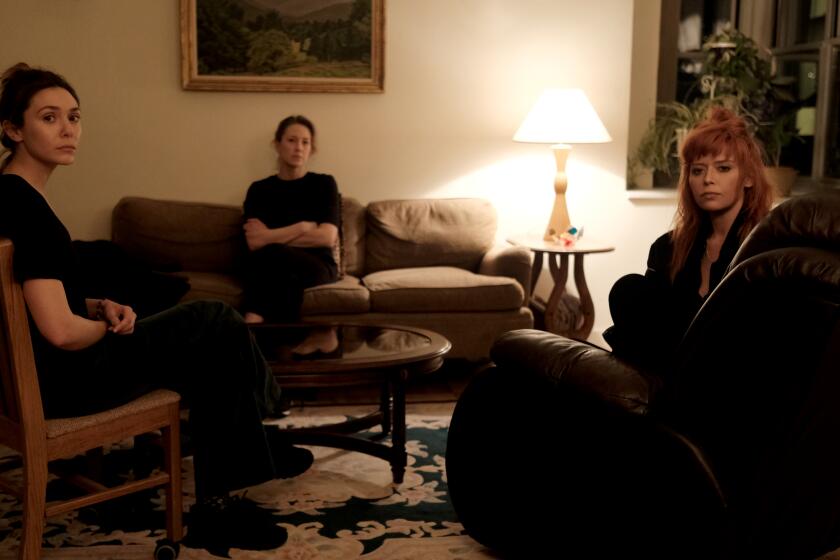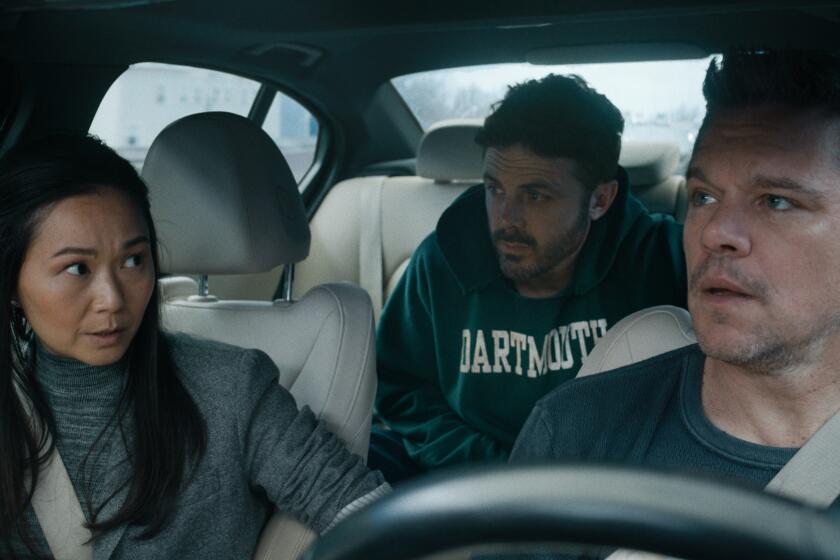Columbia Reaps the Benefits of a Puttnam Legacy That Isn’t
For people who do not follow the tawdry details of the continuing corporate soap opera behind Hollywood, the current movies “The Last Emperor,” “Hope and Glory” and “Leonard Part 6” would seem worlds apart.
One is about a Chinese emperor whose life is a major irrelevancy of 20th-Century nobility. One is about a 7-year-old boy--the cinematic alter ego of the film’s director--who is having a pretty good time during the aerial blitz of World War II London. And one is about a retired superspy who is recruited to save the world from possessed barnyard animals.
The first two films are critical thoroughbreds, masterpieces by some critics’ reckoning, and serious contenders in many categories for the upcoming Academy Awards. The third is a $20-million disaster, a thudding critical and commercial embarrassment that is a contender for critics’ “10 Worst” lists and nothing more.
What links the films is their American distributor, Columbia Pictures, and the ghost of its chairman past, David Puttnam.
People who were enchanted by the controversial Puttnam want to credit him with “Hope and Glory” and “The Last Emperor.” People alienated by him want to blame him for “Leonard Part 6.”
The truth is that Puttnam, who would love to take credit for the first two and erase the third from his memory, is not responsible for any of them.
When the British producer arrived at Columbia in mid-1986, Bernardo Bertolucci’s “The Last Emperor” was already in production, and he merely acquired it for distribution. The money for John Boorman’s “Hope and Glory” was committed, reluctantly, by the parent Coca-Cola Co. The negotiations for “Leonard Part 6,” from an idea by its star, producer and effervescent Coke spokesman Bill Cosby, had been concluded by interim Columbia boss Steve Sohmers.
But Puttnam’s name is inextricably bound to the three movies. Whether he bought or inherited them, “The Last Emperor” and “Hope and Glory” reflect his film-making tastes and are clear road markers showing the direction in which he had hoped to head the studio.
The two films are very different. “The Last Emperor” is an old-fashioned epic, a feast of images and cultural intrigue that immediately takes its place among the great spectacles in film. “Hope and Glory” is a dramatized collection of childhood memories, an impression piece that comes alive as a visual novel.
They are alike in that that they are not like anything else. They are singular stories, told with great craftsmanship and without compromise. They are story vehicles, as opposed to star vehicles, and the fact that they are being distributed at all by a major studio flies in the face of conventional Hollywood wisdom.
That wisdom, on the other hand, does explain “Leonard Part 6.”
Here is a movie that was made simply because Bill Cosby finally relented to one of his suitors. Most of the major studios had been serenading under his balcony ever since “The Cosby Show” hit No. 1 on the Nielsen charts. It was just a matter of time before he took his pick and demurely steadied the ladder.
Rational people outside the business might wonder why a studio would want to spend $20 million on a movie starring a person who can be seen free by anyone who has a television set and the patience to watch it for a few minutes. Cosby, the most visible product huckster on television since Mad Man Muntz, seems to be available on one or another commercial 24 hours a day.
Still, the opportunity to test Cosby’s appeal at the box office was more than Columbia’s Sohmers could resist and the deal was all but signed when Puttnam arrived.
There was nothing more to the Cosby deal than a story idea provided by Cosby and a commitment from the comic to produce the film and to star in it. It was, in fact, an almost perfect example of the “shooting deals instead of movies” thinking that Puttnam had devoted so much time to criticizing.
Yet, in a burst of illogical rookie enthusiasm, Puttnam confused the Cosby deal with the Cosby show and, in his first official press statement as a studio chief, proclaimed that the movie signifies what “Columbia will be all about, entertainment with a heart and a mind.”
What it really was was a bad omen. If rumor has it correctly, it was Cosby, more than anyone else, who caused Puttnam to be forced out at Columbia.
The star reportedly went to the Coke people during post-production squabbles over “Leonard Part 6” and, depending on who’s telling the story, either added one more grievance to the growing stack in Puttnam’s file, or insisted that the British upstart be given the sack.
Puttnam said recently that he only met Cosby twice and that they had no direct confrontations over “Leonard.” The Cosby camp has steadfastly refused to comment.
If the movie speaks for itself, it is apparent who committed the fowl. “Leonard” is less a movie than a series of goof-offs. It’s as if someone had plugged into Cosby’s brain, collected a month’s worth of random neurotransmissions and strung them together in a script.
Cosby, in a moment that must have caught Columbia’s marketing people short, went on Larry King’s CNN show two weeks before the movie opened and calmly advised his fans not to buy a ticket to “Leonard Part 6” until getting the advice of someone--presumably, not a fan--who had bought one.
Whether this advice helped steer money away from Columbia, or whether his fans got an early whiff of “Leonard” through other sources, the movie arrived DOA at more than 1,100 theaters Dec. 18. After 10 days, it had grossed $3.1 million and looks to be Christmas ‘87’s biggest turkey.
That it may have taken Puttnam--who probably wouldn’t have made the movie for $1.98--down with it is one of the year’s choice ironies.
If Columbia’s new administration was withholding Academy Award support for “Hope and Glory” because it was perceived as a “Puttnam picture,” the three awards for best picture, best director and best screenplay that it won from the Los Angeles Film Critics Assn. has forced the issue.
“The awards did jolt them into a little action,” said director John Boorman, in a telephone conversation from his home in Ireland. “They now have quite an expensive campaign coming.”
Boorman said Columbia is preparing to spend $35,000 on a mailer that it will send to academy members, reminding them of the critics’ awards and there will be a major advertising campaign in the trade newspapers Daily Variety and the Hollywood Reporter.
“There had been some money allocated (for an Oscar campaign), so I wouldn’t say it was exactly reluctance,” Boorman said. “We just couldn’t get them to make a commitment. It is inevitable when new management comes in that they are not particularly interested in what the last management did. We were afraid we were getting caught up in that.”
Last week, “Hope and Glory” executive producer Jake Eberts said he was afraid that the studio was not promoting the film because it had a Puttnam label on it when it, in fact, had not been put into production by Puttnam.
Boorman said the film, based on his own experiences as a child during the London Blitz, had been turned down by virtually every major studio and the project was almost abandoned when Coca-Cola refused to honor a commitment that the head of its video company, Embassy Home Entertainment, had made without approval.
According to Boorman, Embassy’s Andre Blay committed the entire $9.3-million budget two weeks before he believed his offer to buy Embassy from Coke was to be approved. Then, with “Hope and Glory” in production, the deal fell through and the payments stopped coming.
“Lawsuits were flying all over the place and we were stuck in the middle,” Boorman said. “Eventually, Jake and (Boorman’s agent) Jeff Berg persuaded Coke that they had a moral obligation. At 11 o’clock the night before I was to lay the whole crew off, we were told we had the money to finish it.” A spokesman for the film confirmed that account.
Boorman and Eberts said “Hope and Glory” was assigned by Coke to Columbia for distribution. Puttnam said he found it dangling in corporate limbo, like manna from heaven, and seized it for Columbia. Puttnam actually upped Coke’s investment on the film, buying the rights to several foreign markets from Goldcrest Films.
However it got on the studio’s release schedule, “Hope and Glory” proved to be one of the season’s gems. The film is currently playing in only 86 theaters, with a wider national opening planned for late January and early February.
How much advertising support its wide opening gets seems to depend largely on how well it does with Oscar nominations. The L.A. critics have apparently enhanced its chances.
More to Read
Only good movies
Get the Indie Focus newsletter, Mark Olsen's weekly guide to the world of cinema.
You may occasionally receive promotional content from the Los Angeles Times.










